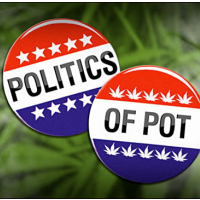U.S. Justice Department Says Tribes Can Grow and Sell Marijuana

The federal government has been no friend of California's legal medical marijuana industry and its patrons, busting dispensaries, pressuring local governments and reminding everyone that growing and selling marijuana is still a federal offense.
On Thursday, the schizophrenic on-again off-again recognition by the feds that states and localities are legalizing marijuana took another turn (pdf) when the U.S. Department of Justice (DOJ) announced that Native American tribes can grow and sell marijuana on their lands. The policy announcement, delivered at the request of some tribes, said tribes will be allowed to traffic in marijuana if they meet the same eight guidelines applied to the states.
They have to keep pot growing off public lands and possession off federal property. Steps must be taken to keep it away from minors, and dealing in pot can’t be used as a cover to traffic in other illegal drugs. Drugged driving should be discouraged and guns shouldn’t be part of the cultivation and distribution process. And then there’s the big bugaboo that the feds often mention when busting dispensaries in California—revenue from sales can’t go to criminal enterprises, gangs or cartels.
There are 326 federally recognized reservations, according to the Bureau of Indian Affairs. And around 115 of the 566 tribes recognized by the federal government are in California. They are the beneficiaries of changes in federal and state law that allowed for the proliferation of casinos on tribal properties. That has proven to be hugely profitable for tribes, but it remains to be seen how the marijuana business will shake out in the state.
California is still struggling to establish a system of cultivation and distribution that satisfies the feds. Localities have been given authority by the state to exercise a broad range of options for implementing the state law legalizing medical marijuana dispensaries. Gigantic growing enterprises are prohibited, fostering a cottage industry of collectives fed by smaller providers.
It is unknown how the marketplace would change if tribes get aggressively involved. Marijuana-selling tribes may not have to pay state and local taxes, allowing them to slash prices and undercut the off-reservation competition. Taxes on recreational pot in Washington State have doubled the price of medical marijuana.
So far, there is no indication that Native Americans will get into the business. Addiction and substance abuse are significant issues in many Native American communities. And in the run-up to the Justice Department finally issuing its memorandum this week, tribes were deeply divided on what outcome they hoped for.
The 2012 National Survey on Drug Use and Health found that, “Native Americans or Alaska Natives were more likely than persons from other racial/ethnic groups to have needed treatment for alcohol or illicit drugs in the past year (17.5 vs. 9.3 percent).”
Growing and selling pot in a state like California and three other Western states, where some form of legalization already exists, will not present the same challenges as in Montana, South Dakota, Oklahoma and other states with tribal reservations but no legalization. That could be problematic.
“A situation is quickly forming where people living in states who do not want legalization will in fact be living 10 minutes away from a marijuana store,” Kevin Sabet, a former presidential drug adviser and co-founder of the anti-legalization group Smart Approaches to Marijuana, told US News.
Policing of marijuana activities on reservations will be restricted to tribal authorities and the offices of the U.S. Attorneys. The Los Angeles Times said that in certain cases only the U.S. Attorneys can pursue federal marijuana-related charges.
–Ken Broder
To Learn More:
DOJ Says Indian Tribes Can Grow and Sell Marijuana (by Gosia Wozniacka, Associated Press)
U.S. Won't Stop Native Americans From Growing, Selling Pot on Their Lands (by Timothy M. Phelps, Los Angeles Times)
Tribes Can Legalize Pot, Justice Department Decides (by Steven Nelson, U.S. News & World Report)
Need for and Receipt of Substance Use Treatment among American Indians or Alaska Natives (National Survey on Drug Use and Health)
Native American Tribe Tries to Ban Marijuana from 10.8 Million Acres It Gave Up in 1855 Treaty (by Noel Brinkerhoff, AllGov)
- Top Stories
- Controversies
- Where is the Money Going?
- California and the Nation
- Appointments and Resignations
- Unusual News
- Latest News
- California Forbids U.S. Immigration Agents from Pretending to be Police
- California Lawmakers Urged to Strip “Self-Dealing” Tax Board of Its Duties
- Big Oil’s Grip on California
- Santa Cruz Police See Homeland Security Betrayal in Use of Gang Roundup as Cover for Immigration Raid
- Oil Companies Face Deadline to Stop Polluting California Groundwater





